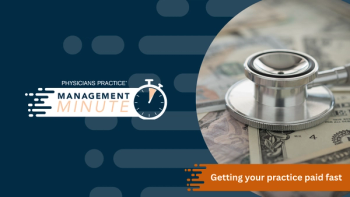
Underdog Doc Takes on Payers for Patient
Daniel Block, MD, describes his best day as a physician, a day when he took on his patient's insurance company to get the patient the prescription drug he needed.
The call came in some time late on a Thursday afternoon. In the 16 years I had been practicing medicine, I had never felt as drained or disgusted as I did that day. I checked the caller ID and recognized one of my long-time patients: As I answered the phone, I felt a wave of adrenaline hit my gut. It was John (as I will call him), a 61-year-old chronically- and physically-disabled man who was living completely alone on a large property ever since his Canine Partner for Life had died and his two sons had moved out.
Although I am his psychiatrist, and not a social worker, he has always looked to me to help with his other problems. For instance, I have petitioned the local power company on three separate occasions not to turn off his power. This time, though, proved more difficult.
I answered the phone, steeling myself, knowing I would be called upon to solve another problem. John told me that the medication I had prescribed for his severe case of restless legs - a condition associated with his underlying sleep apnea - had again been denied. I had already appealed once by providing documentation that pramipexole was the only medication that worked for John. The insurance company sent back a letter informing me that "the patient needs to fail trials of levodopa, clonidine, carbidopa, and gabapentin." I in turn argued that these medications were not FDA approved for restless leg syndrome. Only the ropinirole (which had failed to work for John) and pramipexole were FDA approved for this disease. But the insurance company refused to budge.
So John was calling, desperate and financially destitute. Without restless leg medication, he was unable to sleep, and, already suffering from obstructive sleep apnea and a host of other medical problems, he was beginning to panic. The last time he reached a state of panic, he ended up in the hospital in congestive heart failure.
I felt powerless, something to which I was not accustomed, and it struck me that I was feeling exactly the way John must have been feeling - even though I had my mobility, my work, my family, and a relatively comfortable life. So I told him to hold on - great advice to someone barely doing so already. I told him that I would get the job done, somehow. He ended the conversation with "I know you will. I have faith in you Dr. Block. I don't know where I'd be without you." Up till now, expressions like that had been limited to patients whose depression I had treated, at times bringing people back from the brink of suicide. I took a breath, cursed out loud to nobody, and blended my consciousness with the global one - the Internet.
I quickly learned that Maximus, whose motto is "Helping government serve the people," was an agency contracted by insurance companies to administer Medicare benefits. It was from Maximus that I had received the final denial letter for John's medication. I had had it, and felt a fury I had not felt in quite some time. I used Google to locate every number I could for the name of the individual who sent the denial letter. It turns out, he was both a pharmacist and an attorney, working as the Medicare Part D project director for Maximus.
I then started working my way down the list of phone numbers. Imagine my surprise and delight when the project director answered my call and asked how I had gotten his (apparently) private number. I launched myself right at him, letting him feel the full weight of my anger, frustration, and disgust. Each time he interrupted I silenced him, and ended my tirade by asking how he thought his government-sanctioned agency would look if it became public that they were demanding the failure of four non-FDA approved medications before they would authorize the appropriate medication for my patient. I must admit, I also told him that I would make sure our conversation would be posted on the Internet, including his private phone number.
He fell silent, then told me someone would get back to me by the end of the next day. I thought, I had been trying to get this medication approved for over a month, so what was one more day? He took my number and that of my patient and ended the call. I called John to let him know about our conversation. He thanked me in his froggy voice and I went home, spent, wondering if there could be a worse day than this in my professional life.
Friday came, and by lunch I still hadn't heard anything from Maximus. I began to wonder if this would actually be my worst day. As I was preparing to leave for the weekend, John's number flashed on the caller ID. I answered, tensing at the expectation of more bad news. "Hello, this is Dr. Block," I said. That familiar froggy voice boomed back "Dr. Block, you're a bad ass." I said "What?" John repeated himself and then told me that a woman from Maximus had called, apologizing for the delay he had suffered in getting his medication, and informed him that it was now approved and that he would be receiving a back-dated authorization. He said "I don't know how to thank you." I said "You just did - I was just doing my job."
Unfortunately, six months later, John called me to say his medication had been unbelievably denied again. I gave him the project director's private number and we both called. John was able to speak with the director's wife, who was apparently very sympathetic. The next day a letter arrived at my office - John's medication is now approved for two years. I guess they'd had enough of this bad-ass physician and his patient.
Daniel Block, MD, has run a solo practice in adult psychiatry in West Grove, Pa. for the past 17.5 years. He completed residency at Thomas Jefferson University Hospital in 1993, medical school at Temple University School of Medicine in 1989, and received his bachelor's degree in English from Franklin & Marshall College in 1985. He resides in Kennett Square, Pa., with his wife of 21 years and their children. When not at the office he enjoys gardening, traveling with his family, exercise, and music.
This essay was contributed as part of the October 2010 Physician Writer Search topic "My Best/Worst Day as a Physician."
Newsletter
Optimize your practice with the Physicians Practice newsletter, offering management pearls, leadership tips, and business strategies tailored for practice administrators and physicians of any specialty.








